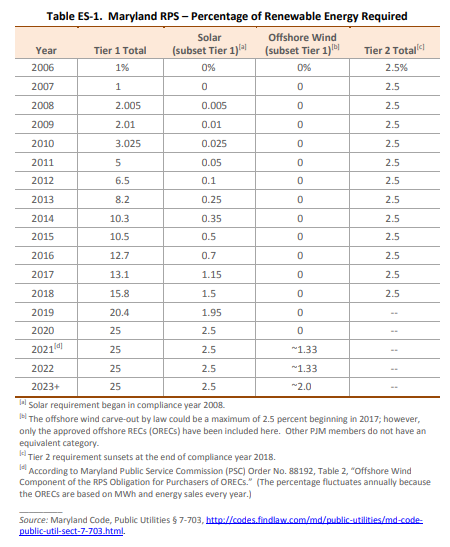Maryland RPS Requirements: A Focus on Offshore Renewable Energy Certificates
3 min readMaryland, like many states, is taking the initiative to address climate challenges by reducing their carbon footprint. In 2019, Maryland passed the Clean Energy Jobs Act, which requires energy consumers to consume at least 50 percent of their electricity from renewable energy by 2030. To reach this goal, the state has increased its renewable portfolio standards (RPS), which mandates that energy suppliers in the state procure a minimum portion of their power sales from eligible renewable energy sources.
The eligible renewable energy sources include:
- Tier 1 renewables such as solar, wind, biomass and other sources. Tier 1 is also composed of two carve-outs that make up the entire Tier 1 requirement and have their own targets that must be met.
They include:
-
- Solar carve-out
- Offshore wind renewable energy certificates (ORECs) carve-out
- Tier 2 renewables include large hydroelectric power.
The 2019 mandate requires a certain percentage of the electricity consumed to be generated from solar by 2030. In addition, offshore wind generation requirements increased from 480 megawatts to 1,200 MW by 2030. The rest of the energy would be required to come from other Tier 1 sources (See the chart below for specific requirements by year.
It is important to note that the OREC obligation is dependent on approved offshore wind facilities reaching commercial operation. This means that the OREC percentage requirements established by the Maryland Public Service Commission (PSC) and set forth in Table ES-1 below are subject to reduction or delay if development of those projects is delayed, as has already happened and is further described below.
Because ORECs are a Tier 1 carve-out, if there is a decrease or removal of the OREC requirement in a particular compliance year, retail energy suppliers are required to make up that decreased or removed OREC amount with other Tier 1 resources.

Source: Maryland Department of Natural Resources report.
These requirements impact customers and their energy suppliers who are tasked with supplying the renewable energy, which has catalyzed the creation of new solar and wind projects across the state.
Approval of Two Large-Scale Wind Projects
To meet the offshore wind generation goal that more than doubles the current offshore target, Maryland has approved two offshore wind projects that are being built off the coast of Maryland — known as U.S. Wind and Skipjack. U.S. Wind will generate 248 MW whereas Skipjack will generate 120 MW, for a combined capacity of 368 MW. In addition, development of these projects is estimated to create almost 10,000 direct and indirect jobs.
Originally, the commercial operation dates for U.S. Wind and Skipjack were projected for January 2021 and November 2022 respectively. It was based on those projections that the PSC established the OREC carve-out values reflected in Table ES-1. However, both projects have now been delayed with the earliest commercial operation dates projected to be 2024 for U.S. Wind and 2026 for Skipjack.
As noted above, energy suppliers are required to purchase ORECs produced by approved offshore wind projects once each project reaches commercial operation and begins generating electricity. In some cases, retail suppliers included OREC costs in customer contracts based on the projects’ originally-projected commercial operation dates. Now that those commercial operation dates have been delayed, suppliers’ obligation to purchase ORECs has also been delayed. At the same time, suppliers are required to supply additional Tier 1 resources to make up for the loss of the OREC carve-out.
Note: there is currently proposed legislation in the state of Maryland, which could further impact compliance percentages and compliance payments for certain renewable resources, of which Constellation’s legal and regulatory teams continue to monitor.
What This Means for Energy Consumers
The effect of the delay will likely impact your energy bill, but it depends on how your RPS and OREC costs were priced into your original contract with your retail supplier. Not every energy supplier has the option for fixing RPS or OREC costs in their energy contracts, and customers could receive an unanticipated charge at the point at which the projects come online and when suppliers are obligated to pay these costs.
Constellation gives its customers the option of including these charges in their energy contract at either a fixed or passed through rate. Depending on if you fixed or passed through RPS and/or OREC costs in your energy contract with Constellation, you may see either credits or a minimal charge on your invoice as a result of the delay in the offshore wind projects.
Constellation is committed to being transparent and keeping you apprised of any costs that may impact your business’ energy bill. If you have any questions about this change, please contact your Constellation representative or call our Customer Care Center at 1-844-6-ENERGY (1-844-636-3749).

